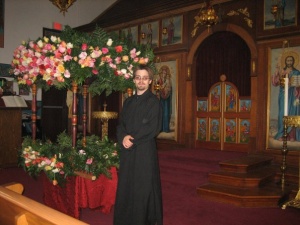Difference between revisions of "Reader"
m (add series box) |
|||
| Line 1: | Line 1: | ||
| − | A '''reader''', also called a '''lector''' (in Greek, αναγνώστης, anagnostis or anagnostes; in Slavonic, Чтецъ, chtets) is one of the [[minor orders]] of the [[Orthodox Church]], a sub-clerical order to which a man is [[tonsure]]d, setting him apart as blessed by the [[bishop]] to read the [[apostolos|epistle]] readings in the [[Divine Liturgy]]. He may also serve as a [[cantor]], [[catechism|catechist]], or in other leadership roles in the local [[parish]] community. | + | [[image:Readermike.jpg|thumb|right|A Reader in cassock.]]A '''reader''', also called a '''lector''' (in Greek, αναγνώστης, anagnostis or anagnostes; in Slavonic, Чтецъ, chtets) is one of the [[minor orders]] of the [[Orthodox Church]], a sub-clerical order to which a man is [[tonsure]]d, setting him apart as blessed by the [[bishop]] to read the [[apostolos|epistle]] readings in the [[Divine Liturgy]]. He may also serve as a [[cantor]], [[catechism|catechist]], or in other leadership roles in the local [[parish]] community. |
This order is higher than the [[doorkeeper]] (now largely obsolete) and lower than the [[subdeacon]]. The reader's essential role is to read the Old Testament and Epistle lessons during the Divine Liturgy and other services, as well as to chant the Psalms and the verses of certain [[antiphons]]. There is a special service for the [[tonsure|tonsuring]] of a reader, although in contemporary practice any layman may receive the priest's blessing to read on a particular occasion. The office of a reader subsumes that of a [[taper-bearer]], and the service of tonsuring a reader mentions both functions. | This order is higher than the [[doorkeeper]] (now largely obsolete) and lower than the [[subdeacon]]. The reader's essential role is to read the Old Testament and Epistle lessons during the Divine Liturgy and other services, as well as to chant the Psalms and the verses of certain [[antiphons]]. There is a special service for the [[tonsure|tonsuring]] of a reader, although in contemporary practice any layman may receive the priest's blessing to read on a particular occasion. The office of a reader subsumes that of a [[taper-bearer]], and the service of tonsuring a reader mentions both functions. | ||
Revision as of 14:43, October 11, 2007
This order is higher than the doorkeeper (now largely obsolete) and lower than the subdeacon. The reader's essential role is to read the Old Testament and Epistle lessons during the Divine Liturgy and other services, as well as to chant the Psalms and the verses of certain antiphons. There is a special service for the tonsuring of a reader, although in contemporary practice any layman may receive the priest's blessing to read on a particular occasion. The office of a reader subsumes that of a taper-bearer, and the service of tonsuring a reader mentions both functions.
In the Pre-Nikonian Russian Church, there existed an additional junior grade of reader called psalomshchik (in Slavonic, Ѱаломщикъ), whose sole function was to read the long Kathisma Psalms, thus permitting the reader and chanter to save their voices. This office survives in those churches that utilise the Pre-Nikonian Russian ritual: Old Believers (both priested and priestless), those parishes under ROCOR or the Moscow Patriarchate. The title of psalomshchik survives in the later reformed Nikonian Russian rite as an alternative, slightly archaic and quaint name for chanter.
Readers are permitted to wear a cassock, although many do so only when attending services. Readers will generally not wear a clergy shirt or vestments.
A reader is usually tonsured by the bishop, though in some traditions, an archpriest or archimandrite may do the tonsure with the bishop's blessing if he is not available. In monastic communities, the ruling archimandrite may tonsure those monks over which he rules.
External links
- Readers, Cantors, and Church Music in Early Eastern Christian Worship, by Andrew Stephen Damick
- Instructions . . . For the Church Reader
| This article forms part of the series Clergy |

| ||||||||||||||||||||||||||||
|---|---|---|---|---|---|---|---|---|---|---|---|---|---|---|---|---|---|---|---|---|---|---|---|---|---|---|---|---|---|
| |||||||||||||||||||||||||||||
